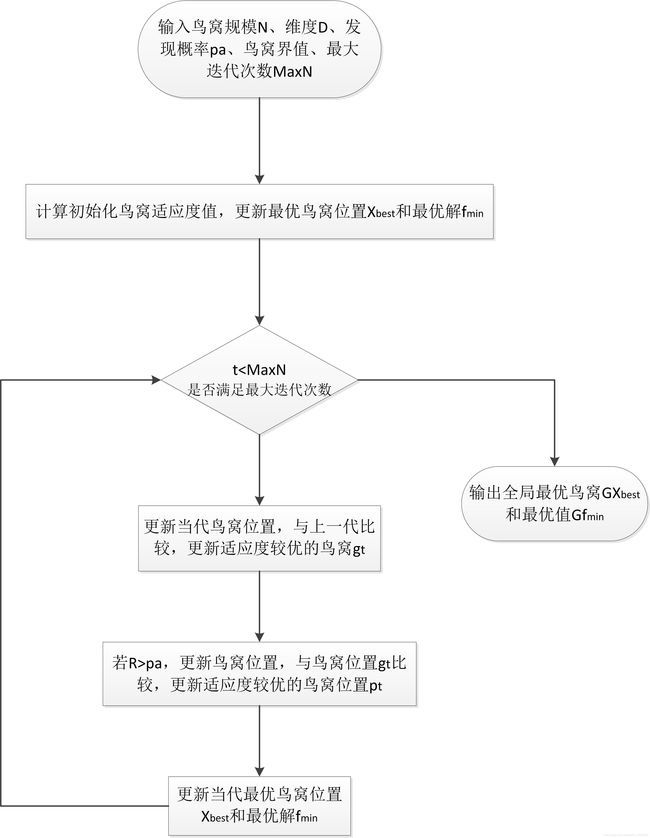布谷鸟优化算法 matlab,布谷鸟算法(Cuckoo Search,CS)MATLAB案例详细解析
一、布谷鸟算法理论
模拟退火算法(SA)、遗传算法(GA)、布谷鸟算法(CS)、人工蜂群算法(ABC)学习笔记—附MATLAB注释代码
二、CS算法应用于函数优化
1.流程图
3.代码解析
3.1 主函数 Csmain.m
% Script 布谷鸟算法,求解函数最小值
% @author zhaoyuqiang
%#ok Remove hints of syntax
%#ok
%#ok
clear all ;
close all ;
clc ;
N = 25; % 鸟巢的数量Number of nests(The scale of solution)
D = 10 ; % 问题的维度,一个鸟巢鸟蛋的个数 Dimensionality of solution
T =500 ; %迭代次数的上限 Number of iterations
Xmax = pi ;%%函数上限
Xmin = -pi ;%%函数下限
Pa = 0.25 ; % Probability of building a new nest(After host bird find exotic bird eggs)
nestPop = rand(N,D)*(Xmax-Xmin)+Xmin ; % 初始化寄主的鸟巢Random initial solutions
for t=1:T
levy_nestPop = func_levy(nestPop,Xmax,Xmin) ; % 通过levy飞行产生一个解Generate new solutions by Levy flights
nestPop = func_bestNestPop(nestPop,levy_nestPop); % 与上一代比较,更新适应度较优的鸟巢Choose a best nest among new and old nests
rand_nestPop = func_newBuildNest(nestPop,Pa,Xmax,Xmin); % 根据发现概率舍弃一个鸟巢并建立一个新鸟巢Abandon(Pa) worse nests and build new nests by (Preference random walk )
nestPop = func_bestNestPop(nestPop,rand_nestPop) ; %列出当前最佳的鸟巢 Choose a best nest among new and old nests
[~,index] = max(func_fitness(nestPop)) ; % Best nests更新当代最优鸟巢的位置
trace(t) = func_objValue(nestPop(index,:)) ;
end
[~,index] = max(func_fitness(nestPop)) ; % 查找当前最优鸟巢
%%%输出这个鸟巢里的每个鸟蛋,即是每个解
nestPop(index,:)
figure
plot(trace);
xlabel('迭代次数') ;
ylabel('适应度值') ;
title('适应度进化曲线') ;
3.2 Levy飞行 func_levy.m
说白了就是实现一个随机搜索的公式来更新鸟巢的位置,
Xt+1 = Xt + α \alphaα S
S就是服从Levy分布
Levy~u = t -β \betaβ ,1<= β \betaβ <=3的随机步长。
具体公式解析参考:
通俗易懂的布谷鸟算法与莱维飞行,(附求解函数最小值matlab源码)
function [ result ] = func_levy( nestPop,Xmax,Xmin)
%FUNC_LEVY : Update position of nest by using Levy flights
%@author : zhaoyuqiang
[N,D] = size(nestPop) ;
% Levy flights by Mantegna's algorithm
beta = 1.5 ;
alpha = 1 ;
sigma_u = (gamma(1+beta)*sin(pi*beta/2)/(beta*gamma((1+beta)/2)*2^((beta-1)/2)))^(1/beta) ;
sigma_v = 1 ;
u = normrnd(0,sigma_u,N,D) ;%(第一个参数代表均值,sigma参数代表标准差),生成N×D形式的正态分布的随机数矩阵。
v = normrnd(0,sigma_v,N,D) ;
step = u./(abs(v).^(1/beta)) ;
% alpha = 0.1.*(nestPop(randperm(N),:)-nestPop(randperm(N),:)); % Bad effect
nestPop = nestPop+alpha.*step ;
% Deal with bounds
nestPop(find(nestPop>Xmax)) = Xmax ; %#ok%查找大于Xmax的元素
nestPop(find(nestPop
3.3 与上一代比较,返回较优的鸟巢 func_bestNestPop.m
function [ nestPop ] = func_bestNestPop( nestPop,new_nestPop )
%FUNC_ 此处显示有关此函数的摘要
%@author zhaoyuqiang
index = find(func_fitness(nestPop)
3.4 根据发现概率,舍弃一个鸟巢并建立一个新鸟巢 func_newBuildNest.m
function [ nestPop ] = func_newBuildNest( nestPop ,Pa ,Xmax,Xmin)
%FUNC_NEWBUILDNEST new solutions are generated by using the similarity
% between the existing eggs/solutions and the host eggs/solutions with a discovery rate pa .
%@author zhaoyuqiang
[N,D] = size(nestPop) ;
%%根据发现概率发现鸟蛋,舍弃鸟窝
nestPop = nestPop+rand.*heaviside(rand(N,D)-Pa).*(nestPop(randperm(N),:)-nestPop(randperm(N),:));
% Deal with bounds
nestPop(find(nestPop>Xmax)) = Xmax ; %#ok建立新的鸟窝
nestPop(find(nestPop
3.5 目标函数
function [ result ] = func_objValue( pop )
%FUNC_OBJVALUE 计算目标函数
objValue = sum(pop.^2,2);
result = objValue ;
end
三、输出结果
适应度变化曲线
打印最优解
四、CS案例MATLAB源码下载
布谷鸟算法应用与函数优化详细解析代码以及参考资料.zip


